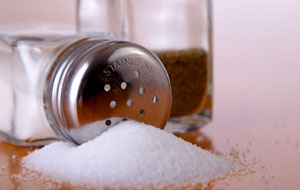If you’ve ever tasted foods that have not been salted, you know that—depending on the dish—it can taste pretty bland. While salt enhances foods to a level that completely changes the taste, it’s important to know how salt can affect your health. Consuming too much salt can lead to too much sodium in your blood, which leads to increased blood volume, which leads to your heart needing to work harder to move the blood through your blood vessels. This can result in increased pressure in your arteries. The kidney naturally balances the amount of sodium stored in the body. When sodium levels are low, the kidney holds on to the sodium. When sodium levels are high, the kidney excretes the excess sodium in urine. When the body retains too much sodium it can lead to congestive heart failure, heart disease, kidney disease, and stroke.
The average American gets about 3,400 mg of sodium per day. The 2010 Dietary Guidelines for Americans recommend limiting sodium to less than 2,300 mg per day, or 1,500 mg if you’re age 51 or older, or if you have high blood pressure, diabetes or chronic kidney disease.
The main sources of sodium in an average diet come from the kitchen, from condiments to recipe ingredients to salting foods at the table; from foods that contain natural sources of salt, such as meat, milk and shellfish; and from prepared and processed foods, such as bread, cheese, fast foods, etc.
There are several avenues you can take to help reduce your salt intake: choose low sodium products; eat fresh foods, such as fruits and vegetables; read food labels; remove salt from recipes; and substitute salt in recipes with herbs and spices.

